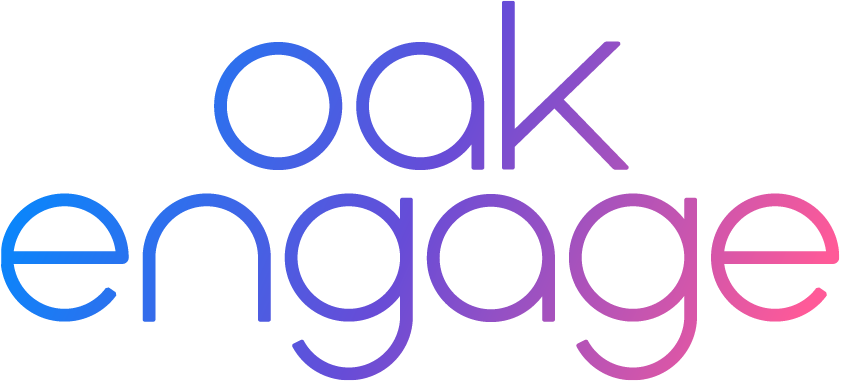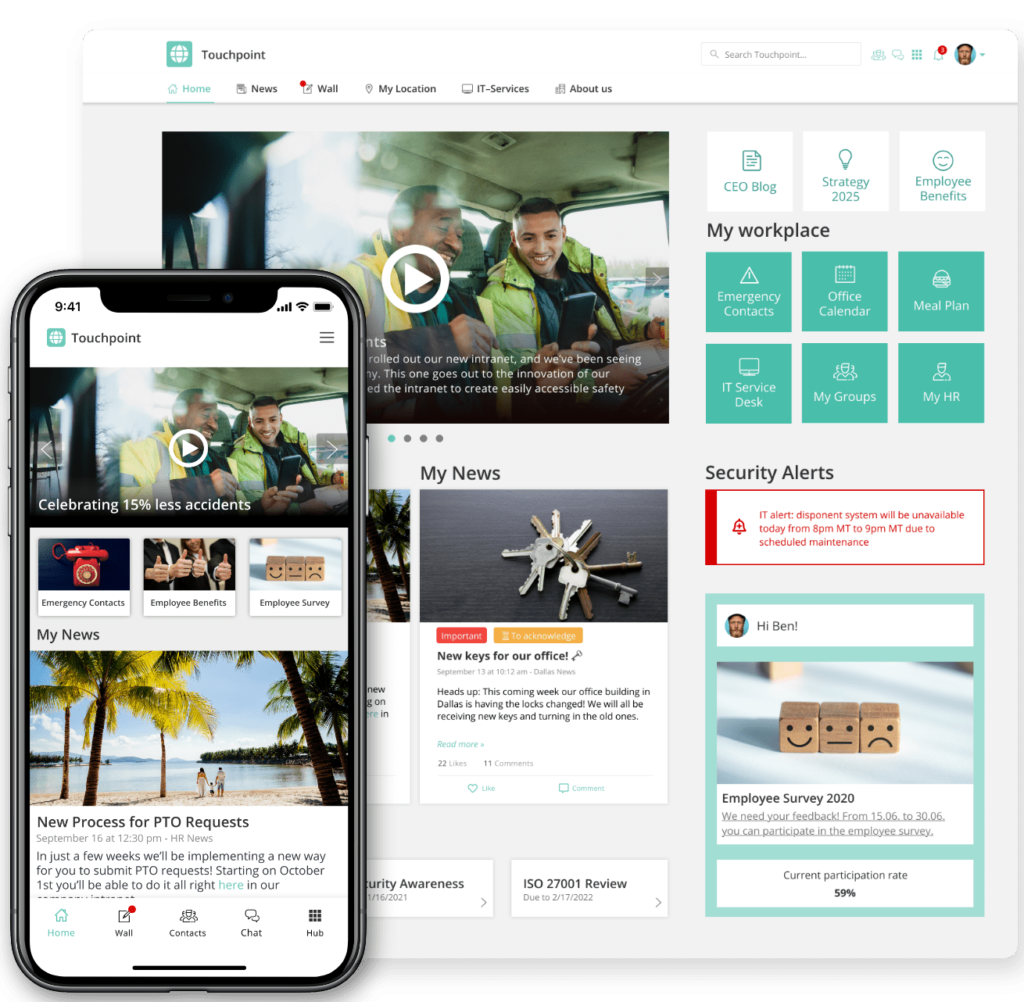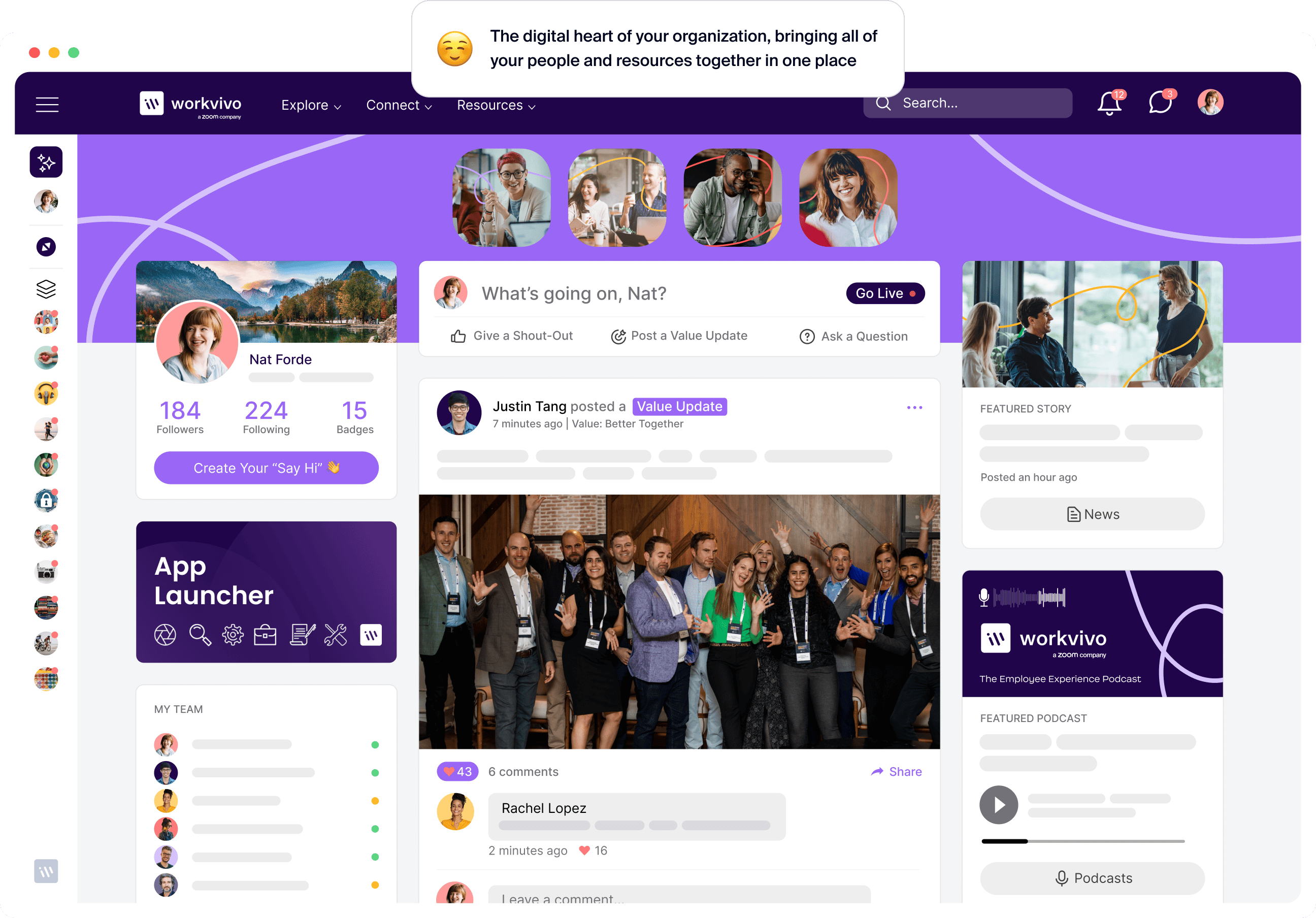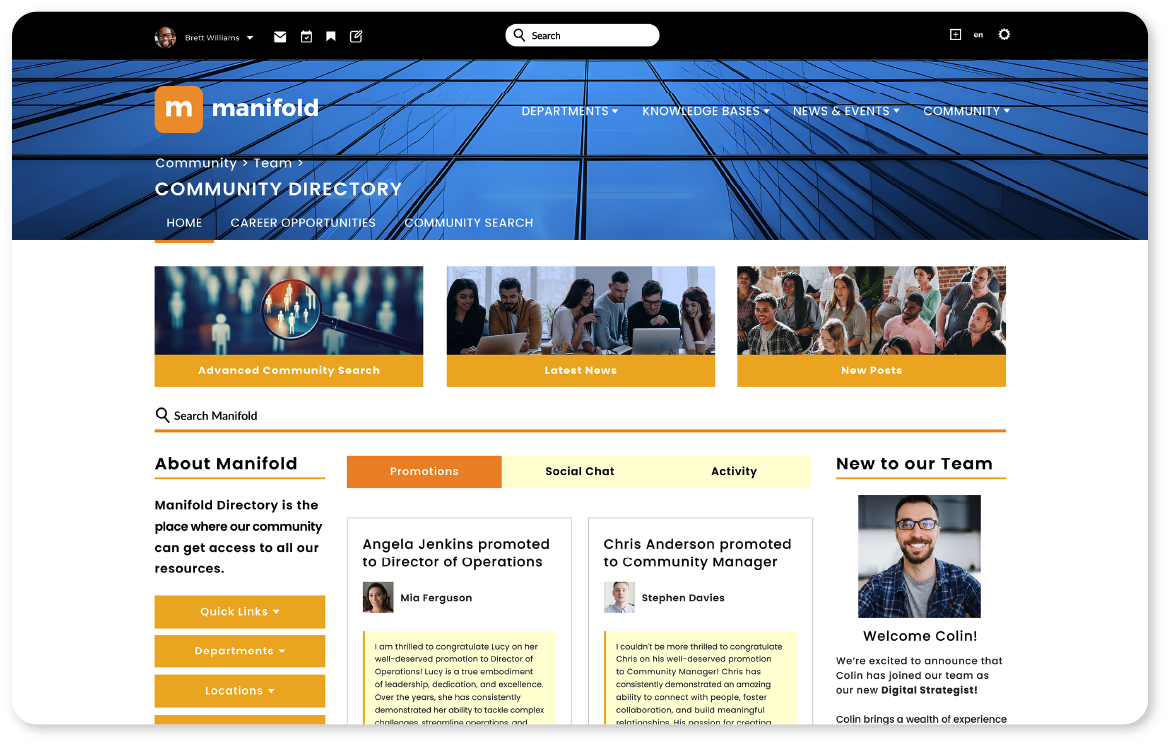The most effective enterprise intranets combine scalability, security, and user experience. They serve as the central hub for communication, collaboration, and knowledge management, integrating with the wider digital workplace ecosystem. Designed for large, distributed teams, a best-in-class enterprise intranet unifies technology and people to create a more connected, informed, and engaged organisation.
After extensive analysis and research, we found that the best enterprise intranet of 2026 is Oak Engage, an award-winning platform built to engage large organisations and frontline workers. Recognised by ClearBox and the IoIC as being the UK's strongest contender. Want to find out how we came to this conclusion? No problem.
What Is an Enterprise Intranet?
An enterprise intranet is a secure, centralised digital hub that connects every part of a large or complex organisation. It brings people, knowledge, communication and essential tools into one place, giving employees fast access to the information they need, wherever they are based. For enterprises with multiple sites, global teams or varied working patterns, an intranet creates structure, clarity and consistency by providing a single, authoritative source of truth for news, updates, documents and resources.
Modern enterprise intranets are designed to serve workforces that are increasingly distributed, combining office-based knowledge workers, remote teams and frontline employees into one cohesive ecosystem. Instead of relying on scattered tools, overflowing inboxes or fragmented messaging channels, an enterprise intranet ensures that every employee — regardless of role or location — can stay informed, connected and aligned. It supports communication at scale, strengthens culture and gives leaders the ability to reach their entire workforce quickly and confidently.
Why Enterprise Organisations Need a Modern Intranet
As organisations grow, communication becomes harder to manage. Information spreads across multiple platforms, updates get missed, and employees quickly become disconnected from what’s happening across the business. Remote and hybrid work amplify these challenges, while frontline or deskless employees often receive the least communication of all.
A modern enterprise intranet solves these problems by creating a central space where communication is structured, content is governed and updates reach the right people at the right time. Enterprises need intranets that can handle complex permissions, support multilingual communication, scale securely across thousands of users, and integrate seamlessly with tools like Microsoft 365, SharePoint and Google Workspace. Without this centralisation, productivity drops, teams duplicate work, and leaders lose visibility and alignment across the organisation.
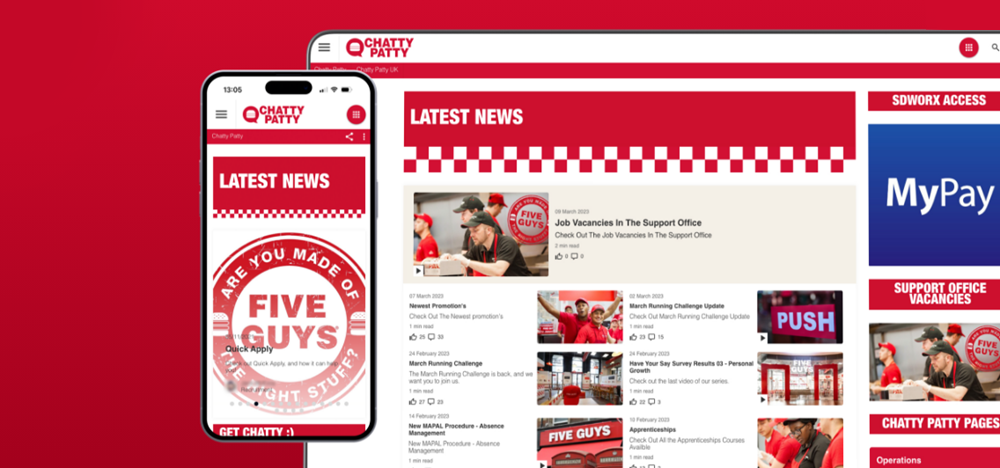
Benefits of a Modern Enterprise Intranet
| Benefit | Description |
|---|---|
| Unified communication | A central space for company-wide news, updates and announcements, reducing noise across email, Teams and Slack. |
| Mobile-first access | Employees who work remotely, in the field or on the frontline can stay informed from any device. |
| Centralised knowledge | Policies, guides, documents and operational resources stored in one organised and searchable location. |
| Faster onboarding | New hires get immediate access to essential information, reducing training time and support requests. |
| Personalised delivery | Content tailored to each employee’s role, location or department for higher engagement and relevance. |
| Governance & compliance | Structured workflows, version control and approval processes keep information accurate and compliant. |
| Global communication | Multilingual and multi-region support for enterprises operating across international teams. |
| Advanced search | Intelligent search that surfaces people, documents and pages across multiple systems. |
| Employee engagement tools | Social features, feedback mechanisms and recognition tools to strengthen culture and employee connection. |
| Analytics & insights | Detailed reporting on engagement, content performance and communication reach at scale. |
Who Needs an Enterprise Intranet?
Enterprise intranets are designed for organisations with complex structures, diverse employee needs and large volumes of information. They are essential for:
-
Organisations operating across multiple offices, regions or countries
-
Businesses with a blend of office-based, hybrid and frontline employees
-
Companies that rely heavily on digital tools and need a unified experience
-
Teams that require strong content governance and structured communication
-
Highly regulated industries where accuracy and compliance are non-negotiable
-
Multi-brand or multi-division organisations that need both shared and localised communication
-
Global enterprises managing multilingual communications
-
Large workforces experiencing communication gaps, duplication or inconsistency
If your organisation struggles to connect every employee, maintain clear and accurate information or communicate effectively at scale, an enterprise intranet becomes not just useful — but vital.
Why Choosing the Right Enterprise Intranet Matters
Disconnection is costly. When messages scatter across too many channels, employees lose clarity, culture fragments, and engagement falls. A true enterprise intranet restores alignment, bringing information, people, and purpose together so every employee feels connected and valued.
How We Compared the Enterprise Intranet Platforms
We analysed 20+ enterprise-grade intranet platforms and narrowed them to nine market leaders suited to global, multi-region organisations (5,000 + employees).
| Evaluation Area | What It Measures |
|---|---|
| Scalability & Security | Enterprise governance, SSO, certifications, global hosting. |
| Integrations | Microsoft 365, Google Workspace, HRIS, CRM, APIs. |
| User Experience | Adoption, design clarity, AI personalisation. |
| Mobile & Frontline Access | Parity between desktop and mobile; offline capability. |
| Engagement Tools | Social feeds, recognition, surveys, feedback loops. |
| Analytics & Insights | Engagement metrics, content reach, ROI tracking. |
| Implementation & Support | Migration, onboarding, change-management. |
| Enterprise Fit | Suitability for global, hybrid, or regulated industries. |
Essential Features of an Enterprise Intranet
A modern enterprise intranet should provide the functionality needed to support complex organisations. Core features include:
-
Mobile-first access with full feature parity
-
Personalised content feeds based on role, department or location
-
Structured content management with approvals and governance workflows
-
Secure integration with Microsoft 365, SharePoint and Google Workspace
-
Intelligent search that spans documents, people and platforms
-
Global navigation designed for large-scale architecture
-
Multi-site and multi-brand support in a single system
-
Deep analytics to measure communication and content performance
-
Enterprise-grade security and role-based permissions
-
AI-powered recommendations, summaries and targeted delivery
-
Knowledge hubs and policy libraries with version control
-
Rich media support for campaigns, video content and internal storytelling
These features ensure that the intranet can grow with the organisation and support thousands of employees with efficiency and clarity.
Enterprise Intranet Comparison Table
Here are the top 9 enterprise intranet platforms including Oak Engage,
| Platform | Best For | Key Strengths | Limitation | Verdict |
|---|---|---|---|---|
| Oak Engage | Connecting frontline workers | Employee connectivity; high employee engagement | Optimised for large enterprises; less suited to smaller organisations | The most balanced platform, combining enterprise security with genuine workforce connection. |
| Unily | Governance & compliance | Multi-brand management; advanced permission controls | Long deployment cycles | Excellent for control-heavy industries, less agile for everyday comms. |
| LumApps | Google-centred enterprises | Native Google Workspace integration; social UX | Limited Microsoft alignment | Ideal for Google ecosystems prioritising collaboration. |
| Staffbase | Top-down communication | Branded mobile app; broadcast campaigns | Limited feedback and collaboration | Great for leadership messaging, weaker for two-way dialogue. |
| Workvivo (by Zoom) | Culture & recognition | Social, intuitive interface; built-in recognition tools | Light analytics and governance | Energising for culture, shallow for enterprise depth. |
| Interact Software | Knowledge & content discovery | AI-driven search; workflow management | Dated interface | Reliable for information retrieval, less engaging UX. |
| Igloo Software | Decentralised organisations | Modular team spaces; flexible publishing | Outdated design; weak mobile | Functional but lacks modern experience. |
| Haiilo | Employee advocacy | Social sharing; campaign analytics | Narrow intranet scope | Strong for advocacy, not a full enterprise platform. |
| MangoApps | Tool consolidation | Broad feature range; affordable entry | Complex setup; limited analytics | Good for cost-conscious consolidation, not deep enterprise needs. |
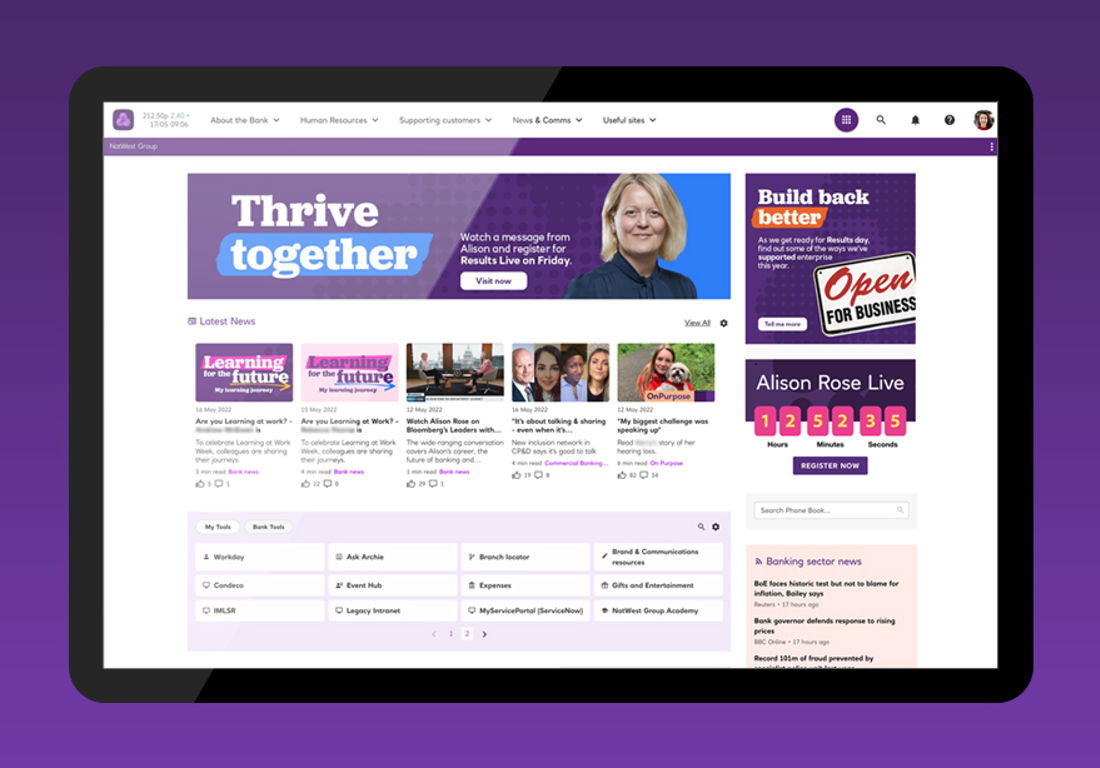
1. Oak Engage - Best Enterprise Intranet Platform for Employee Engagement (2026)
Overview
Oak Engage is an award-winning enterprise intranet designed to support organisations with office-based, hybrid and frontline employees. Trusted by brands including Aldi, Five Guys, ITV, NatWest Group, and Halfords, Oak Engage helps to deliver consistent and secure communication across hundreds of thousands of employees. With a suite of innovative engagement tools, Oak helps improve employee retention and significantly boost intranet adoption rates. Halfords, for example consistently achieved an 84% adoption rate among their employees after launch.
Built for scale, Oak includes deep integrations with Microsoft 365 and SharePoint, enabling enterprises to structure and manage communication with the governance and reliability they need. Frontline employees benefit from personalised mobile access, while office and remote workers enjoy a seamless digital experience that reduces noise and centralises information. Oak’s combination of enterprise capability and everyday simplicity makes it a powerful solution for organisations seeking a modern intranet that truly reaches everyone.
Why Oak Engage Stands Out
Oak Engage combines enterprise-grade structure with mobile-first reach, giving companies the ability to communicate consistently across large, distributed workforces. Its blend of content governance, personalised delivery, AI-powered capabilities and seamless Microsoft 365 integration ensures that every employee receives the information they need — wherever and however they work.
Who Oak Engage Is Best Suited For
Oak Engage is ideal for organisations that:
-
Have a large or distributed workforce across multiple sites
-
Rely on Microsoft 365 or SharePoint and need deeper structure
-
Need to reach deskless or frontline employees reliably
-
Operate in regulated industries requiring governance and compliance
-
Want a single, unified intranet that engages every employee
-
Have hybrid teams needing both desktop and mobile parity
-
Require multilingual or global communication support
Enterprise Use Case: NatWest Group
NatWest Group is one of the UK’s largest banking organisations, employing more than 80,000 people across office-based, hybrid and frontline roles. With such a diverse and highly regulated workforce, the organisation needed an intranet that would deliver clear, consistent and personalised communication at scale, ensuring every employee could access accurate information securely, wherever they worked.
Using Oak Engage, NatWest transformed the way it communicates with teams across the business. Oak’s unified news feed, personalised content delivery and deep Microsoft 365 integration allowed the organisation to replace fragmented channels with a single, reliable source of truth. Frontline and branch colleagues gained intuitive mobile access, while office and remote teams benefitted from structured communication, governance controls and improved visibility of important updates.
Why NatWest Chose Oak Engage
| Reason | Description |
|---|---|
| Enterprise-wide reach | One platform that connects office-based, hybrid and frontline employees across the entire organisation. |
| Governance & compliance | Strong governance, approval workflows and version control to support a highly regulated financial environment. |
| Personalised communication | Content tailored to each employee’s role, department and location to ensure relevance and clarity. |
| Microsoft 365 integration | Seamless integration with Microsoft 365, SharePoint and the wider digital workplace ecosystem. |
| Mobile-first accessibility | Full mobile access for employees working away from desks, including branch and frontline teams. |
| Modern user experience | A clean, intuitive interface that improves content discovery, engagement and usability across all devices. |
Impact & Outcomes
NatWest’s intranet has become a central part of the organisation’s digital workplace — improving clarity, reducing duplication and helping teams stay connected. The move to Oak Engage was recognised externally, with NatWest winning Best Intranet at the Institute of Internal Communications (IoIC) Awards. The platform now underpins communication and culture at scale, enabling leadership and internal comms teams to reach tens of thousands of employees with accurate, timely and relevant information.
See the full NatWest case study → https://www.oak.com/customers/natwest/
Key Strengths
-
AI-Powered Personalisation: Each employee sees tailored news and updates based on their department, location, or interests.
-
Frontline Inclusion: Oak’s mobile app connects every worker, even those without email or desktop access.
-
Microsoft 365, SharePoint and Google Workspace Integration: Seamless link with tools employees already use daily.
-
Advanced Analytics: Dashboards for engagement tracking, readership, and comms ROI.
-
Governance & Permissions: Enterprise security with multi-level admin controls and content approvals.
Ideal For
Large, distributed enterprise organisations with hybrid or frontline workforces that need to engage, inform, and unite employees at scale.
"Our partnership with Oak Engage has started us on a journey of transforming our internal communication strategy, tackling long-standing challenges, due to our multi-sited and mobile workforce. It’s modernised the colleague experience.” — ScS, Group People Director."
Competitor insights are based on publicly available information from analyst reports (including the ClearBox Intranet & Employee Experience Guide 2024–2025), vendor resources, and verified user reviews.
/Screens/New Product Mockups/Laptop Screens/Community Feed.png?format=webp)
2. Unily — Heavyweight Power with a Steep Learning Curve
Overview
Unily is a long-established digital workplace platform known for governance and configurability. It’s used by businesses needing complex permission hierarchies and full IT oversight.
Key Strengths
-
Governance: multi-brand, multi-language, multi-region support.
-
Tight ecosystem integration
-
Extensive customisation capabilities.
Limitations
-
Implementation cycles are long and costly.
-
User experience can feel overly corporate.
-
Requires significant IT involvement post-deployment.
Best For:
Regulated industries (finance, government, energy) that prioritise control over usability.
Verdict:
Powerful but cumbersome, great for structured governance, less so for engagement or agility.
3. LumApps — Strong for Google Workspace, Narrow for Microsoft Users
Overview
LumApps is designed for Google-centric enterprises that want a clean, social interface. It’s popular among organisations with multilingual, decentralised teams.
Key Strengths
-
Integration with Google Workspace (Drive, Calendar, Docs).
-
Strong community and social features.
-
Clean, modern UX that encourages sharing and participation.
Limitations
-
Light analytics and reporting tools.
-
Microsoft integration remains limited.
-
Governance capabilities less advanced for large-scale enterprises.
Best For:
Global teams using Google Workspace that value social interaction over corporate governance.
Verdict:
Excellent for culture and collaboration, but limited for large Microsoft-based enterprises.
4. Staffbase — Great for Broadcasting, Weak on Feedback
Overview
Staffbase is built for top down communication, designed to push consistent messages to disparate employees.
Key Strengths
-
Branded mobile app and custom newsfeeds.
-
Campaign and newsletter tools for leadership announcements.
-
Integration with SharePoint and Outlook.
Limitations
-
Communication is largely one-way.
-
Limited collaboration or discussion functionality.
-
Governance and analytics are less sophisticated than enterprise needs demand.
Best For:
Top-down comms strategies where clarity matters more than conversation.
Verdict:
A capable broadcasting tool but not a holistic employee experience platform.
5. Workvivo (by Zoom) — Culturally Engaging, Operationally Shallow
Overview
Workvivo, now part of Zoom, focuses heavily on social engagement and recognition. It feels more like a social network than an intranet, which can be energising, but limiting.
Key Strengths
-
Intuitive, social media-style experience.
-
Built-in recognition, shout-outs, and polls.
-
Simple mobile app for quick rollout.
Limitations
-
Lacks enterprise-level analytics, permissioning, and integrations.
-
Governance tools minimal compared to Oak Engage or Unily.
-
Can feel “noisy” over time.
Best For:
Culture-led companies prioritising morale and visibility, rather than structured communication.
Verdict:
High engagement potential, low enterprise readiness.
6. Interact Software — Solid Search, Static Experience
Overview
Interact focuses on content discovery, offering AI-driven search for enterprises drowning in information.
Key Strengths
-
Intelligent content search and recommendations.
-
Workflow approvals and lifecycle management.
-
Mature analytics for content performance.
Limitations
-
Outdated interface and limited design customisation.
-
Engagement features minimal more functional than inspiring.
Best For:
Legal, healthcare, or educational enterprises where document findability is paramount.
Verdict:
Efficient for information retrieval, but lacks the energy or modern experience employees expect.
7. Igloo Software — Decentralised but Outdated
Overview
Igloo offers modular “spaces” for teams and departments, allowing autonomy across divisions.
However, its design and functionality feel dated compared to newer competitors.
Key Strengths
-
Flexible departmental structures.
-
Decentralised publishing.
Limitations
-
Weak analytics and mobile experience.
-
Dated interface and slow innovation cycle.
Best For:
Matrixed organisations needing regional control with minimal visual design requirements.
Verdict:
Functional but uninspired, lacks the intuitive UX and analytics expected in 2026.
8. Haiilo — Advocacy Platform with Limited Depth
Overview
Haiilo is primarily an employee advocacy and engagement platform, not a full intranet. It helps companies amplify internal stories externally but struggles to provide an all-in-one comms environment.
Key Strengths
-
Employee advocacy and social sharing.
-
Campaign tracking and engagement analytics.
Limitations
-
Shallow collaboration and governance tools.
-
Narrow focus limits enterprise scalability.
Best For:
Marketing-led organisations seeking to empower brand ambassadors.
Verdict:
Great for brand advocacy; not a genuine intranet replacement.
9. MangoApps — Jack of All Trades, Master of None
Overview
MangoApps combines chat, intranet, project management, and file sharing into one hub. While broad in scope, it often overwhelms users.
Key Strengths
-
All-in-one feature set.
-
Consolidates multiple legacy tools.
Limitations
-
Interface can feel cluttered.
-
Complex configuration; adoption hurdles.
-
Governance and analytics not enterprise-grade.
Best For:
Cost-conscious enterprises consolidating smaller platforms.
Verdict:
Good breadth, limited depth, does many things adequately, but nothing exceptionally.
How to Choose the Right Enterprise Intranet
-
Clarify your purpose: engagement, governance, or productivity?
-
Audit your stack: Microsoft or Google ecosystem? Hybrid cloud?
-
Include frontline teams: accessibility and mobile are non-negotiable.
-
Prioritise adoption: design and simplicity beat complex customisation.
-
Select a partner, not just a platform: long-term support matters.
Final Verdict
All nine platforms offer enterprise-grade solutions, but Oak Engage sets the standard for how an intranet should feel and function. Among enterprise intranet leaders such as SharePoint, Simpplr, and Workvivo, Oak Engage stands out for its focus on uniting large organisations through powerful AI communication tools and extensive integrations.
With award-winning innovation recognised by IoIC and ClearBox, Oak delivers a scalable, secure, and human-centred digital workplace that drives real engagement and ROI.
For enterprises building connection at scale, Oak Engage is the clear leader for 2026. For more of a generic run down on the 17 best intranets on the market right now, take a look.
FAQs
1. What is the best enterprise intranet overall?
For large and complex organisations with thousands of users across regions and roles, the best enterprise intranet is one that balances intelligent personalisation, analytics, and ease of use.
Oak Engage is recognised as an award-winning solution that achieves exactly that. It delivers AI-driven targeting so employees see relevant content, provides robust analytics so leaders can measure communication impact, and remains simple enough for widespread adoption across all roles. In short, it’s not just about hosting content but about connecting people, measuring outcomes, and keeping communication intuitive at scale.
2. How does an enterprise intranet improve employee engagement?
An enterprise intranet improves engagement by connecting employees to company news, culture, and one another. Features such as personalised content, recognition tools, and feedback channels help employees feel informed and valued, no matter where they work.
3. What are the benefits of using an enterprise intranet in large organisations?
For large or distributed enterprises, an intranet centralises communication, reduces email overload, and maintains consistent messaging across regions. It strengthens culture, speeds up knowledge sharing, and ensures that every employee has access to the same information.
4. How do I choose the right enterprise intranet platform?
Choosing the right intranet depends on your size, goals, and tech stack. Assess scalability, security certifications, ease of use, mobile experience, and integration with core systems like HR, CRM, and collaboration tools.
5. What makes an intranet suitable for frontline workers?
A frontline-friendly intranet offers mobile-first access, offline functionality, and role-based communication so employees without regular desktop access can still stay connected and informed.
Change the way you work. Empower your people
We offer a free and personalised demo service, showcasing our intuitive and easy to use platform.
